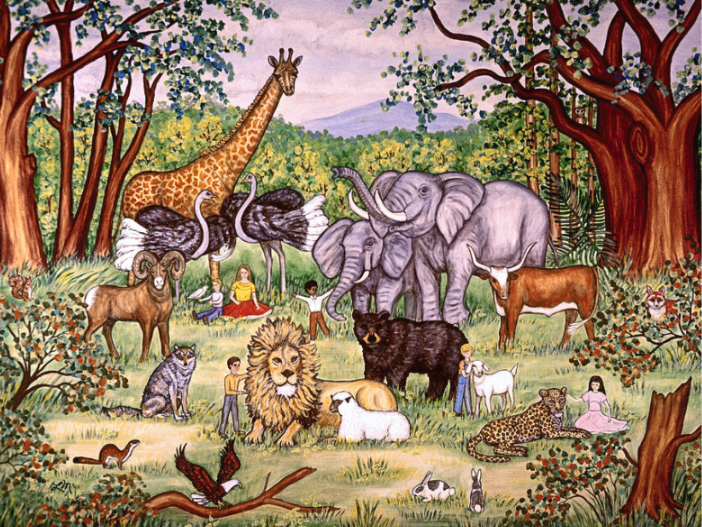A Peaceable Kingdom, by Linda Mears (lindamears.com), Permission requested
“…And God Saw That it was Good"
Twentieth Sunday After Pentecost ● October 6, 2024
Rev. Alexis Lillie © 2024
You can view the full worship video recording at:
https://youtu.be/0qS7ixkxzyg
Scripture Readings:
Genesis 1 (New Revised Standard Version)
The texts of the readings are in the worship bulletin linked here.
In reading our passage today, you may have picked up on a familiar refrain which is what we'll be focusing on here: "And God saw that it was good." We have a lot in common with our four-footed (and otherwise footed!) friends. The fundamental core of what we have in common is raised here: our innate goodness.
Before the created beings in this story have a chance to do anything, try anything, be anything, the divine parent, the Mother God who "gives birth" to all things sees them as blessed, as inherently good.
The genesis creation myth reminds us the universe is good, at its core. Yet this core, fundamental trait has not remained so core and fundamental. I don't need to explain the ecclesial history, and the church fathers, and subsequent theologies that came up with different ways of looking at this. So many of us have our own, personal, lived experience with being taught and treated like we were anything but inherently good, blessed, and whole.
I realized recently how closely I've come to hold this belief about innate goodness and how important it is to the way I view the world, the divine, and my place in it. I’m taking a class that looks at different therapeutic theories, and we were recently talking about an approach that looks at people as basically good. The theory says if we can give people the conditions for flourishing, they will move toward goodness, and growth, and actualization. I was excited to learn of this theory, knowing that this belief is what I would base any therapeutic interaction around, whether or not it was named in an official theory! But … I was in the minority. Many of my classmates shared their discomfort with ascribing innate goodness to all of humanity.
I shouldn’t be surprised this is a prevailing belief -- whether influenced by religion or not. Plenty of things to make us scratch our head when it comes to people's behavior. Inherent goodness is certainly not the story I was raised with! The takeaway from this story in my faith communities of origin was not about creation's innate goodness. The takeaway was about what comes later, that humanity makes some pretty bad decisions, and thus is forever separated from the divine, and our divine nature.
What I never understood, even then, was why we were supposed to accept that interpretation! The original framing, before anything happens, is: "God saw that it was good." Yes, that's pre- apple-and-snake and all of that, but why lean into that negativity of what ends up happening, and not live into the goodness that came before?
So much of the arc of scripture is about looking at things differently: reading from the margins, inverting the status quo, taking the current context and telling stories that resonate but doing so with a twist. So, in this instance, if we lean into our separation from the divine, aren’t we really just buying into the idea that any unwise decisions we make are what define us?
In many ways telling ourselves this story is easy! It's the dominant narrative, the status quo. We receive this messaging in so many corners. As we’ve touched on, unfortunately, it's often what we receive from our families of origin. It's certainly the latent messaging that makes marketing in a capitalistic society so effective. Thus, it's believing -- and living -- like we are good, that can be more challenging
Given when I believe God is up to in the world, I don't think the divine spirit is encouraging us to accept the negative narrative about ourselves. Divine Spirit, in my theology, is certainly not about reinforcing things as they are! Rather we are to counter this narrative and the self-reinforcing loop of negative self-talk we find ourselves in, that goes all the way back to the ancient story of divine separation.
We counter this story with the innate goodness of creation: "God saw that it was good."
Now, it can be easy – or easier – to see this goodness in people or beings we love. But it may be slightly more difficult to see this in ourselves sometimes, especially if we were steeped in an environment where this was outside the realm is possibility. What really took out the last brick of my divine-separation theology was having a kid. It is easier for me to be convinced of my innate divine goodness, because I am sure, beyond a shadow of a doubt, of Junia's divine goodness. The beings we love – our human children, our fur children, our plant babies, our connection to creation – they can be a doorway to the grace of accepting that we are good -- blessed -- enough ... just as we are.

